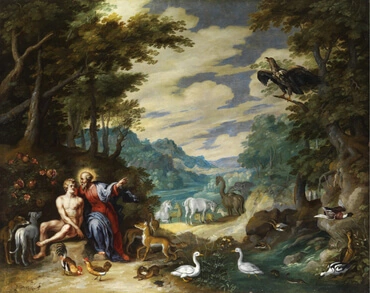1
OR il serpente era astuto più che qualunque altra bestia della campagna, che il Signore Iddio avesse fatta. Ed esso disse alla donna: Ha pure Iddio detto: Non mangiate del frutto di tutti gli alberi del giardino?
2
E la donna disse al serpente: Noi possiamo mangiare del frutto degli alberi del giardino.
3
Ma del frutto dell’albero, ch’è in mezzo del giardino, Iddio ha detto: Non ne mangiate, e nol toccate, chè non muoiate.
4
E il serpente disse alla donna: Voi non morreste punto.
5
Ma Iddio sa che, nel giorno che voi ne mangereste, i vostri occhi si aprirebbero; onde sareste come dii, avendo conoscenza del bene e del male.
6
La donna adunque, veggendo che il frutto dell’albero era buono a mangiare, e ch’era dilettevole a vedere e che l’albero era desiderabile per avere intelletto, prese del frutto, e ne mangiò, e ne diede ancora al suo marito, acciocchè ne mangiasse seco. Ed egli ne mangiò.
7
Allora gli occhi di amendue loro si apersero, e conobbero ch’erano ignudi; onde cucirono insieme delle foglie di fico, e se ne fecero delle coperte da cignersi attorno.
8
Poi, all’aura del dì, udirono la voce del Signore Iddio che camminava per lo giardino. E Adamo, con la sua moglie, si nascose dal cospetto del Signore Iddio, per mezzo gli alberi del giardino.
9
E il Signore Iddio chiamò Adamo, e gli disse: Ove sei?
10
Ed egli disse: Io intesi la tua voce per lo giardino, e temetti, perciocchè io era ignudo; e mi nascosi.
11
E Iddio disse: Chi ti ha mostrato che tu fossi ignudo? Hai tu mangiato del frutto dell’albero, del quale io ti avea vietato di mangiare?
12
E Adamo disse: La donna, che tu hai posta meco, è quella che mi ha dato del frutto dell’albero, ed io ne ho mangiato.
13
E il Signore Iddio disse alla donna: Che cosa è questo che tu hai fatto? E la donna rispose: Il serpente mi ha sedotta, ed io ho mangiato di quel frutto.
14
Allora il Signore Iddio disse al serpente: Perciocchè tu hai fatto questo, sii maledetto sopra ogni altro animale, e sopra ogni altra bestia della campagna; tu camminerai in sul tuo ventre, e mangerai la polvere tutti i giorni della tua vita.
15
Ed io metterò inimicizia fra te e la donna, e fra la tua progenie e la progenie di essa; essa progenie ti triterà il capo e tu le ferirai il calcagno.
16
Poi disse alla donna: Io accrescerò grandemente i dolori del tuo parto e della tua gravidanza; tu partorirai figliuoli con dolori, e i tuoi desiderii dipenderanno dal tuo marito, ed egli signoreggerà sopra te.
17
E ad Adamo disse: Perciocchè tu hai atteso alla voce della tua moglie, ed hai mangiato del frutto dell’albero, del quale io ti avea data questo comandamento: Non mangiarne: la terra sarà maledetta per cagion tua; tu mangerai del frutto di essa con affanno, tutti i giorni della tua vita.
18
Ed ella ti produrrà spine e triboli; e tu mangerai l’erba de’ campi.
19
Tu mangerai il pane col sudor del tuo volto, fin che tu ritorni in terra; conciossiachè tu ne sii stato tolto; perciocchè tu sei polvere, tu ritornerai altresì in polvere.
20
E Adamo pose nome Eva alla sua moglie; perciocchè ella è stata madre di tutti i viventi.
21
E il Signore Iddio fece delle toniche di pelle ad Adamo ed alla sua moglie; e li vestì.
22
Poi il Signore Iddio disse: Ecco, l’uomo è divenuto come uno di noi, avendo conoscenza del bene e del male; ora adunque e’ si convien provvedere che talora egli non istenda la mano, e non prenda ancora del frutto dell’albero della vita, e ne mangi, e viva in perpetuo.
23
Perciò il Signore Iddio mandò l’uomo fuor del giardino di Eden, per lavorar la terra, dalla quale era stato tolto.
24
Così egli cacciò l’uomo, e pose dei Cherubini davanti al giardino di Eden, con una spada fiammeggiante che si vibrava in giro, per guardar la via dell’albero della vita.







